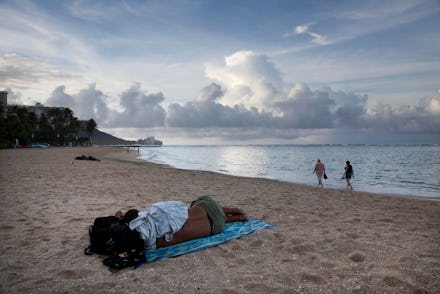Honolulu lawmaker suggests placing armed rangers at parks to drive out the homeless

A Honolulu lawmaker has offered a controversial plan to clean up the city’s parks: Scare away the homeless.
City Councilman Trevor Ozawa recently proposed a policy that would station armed park rangers at Honolulu’s city parks in an effort to drive out the increasing number of homeless people occupying the public spaces.
“We continue to see enforcement issues, continue to have issues with our homeless population in our parks, and need to make our children’s safety a priority,” Ozawa told the Honolulu Star-Advertiser. “We need to continue exploring ways of keeping our park users safe and our facilities free of vandalism and destruction.”
An estimated 7,921 people were homeless in Hawaii in January 2016, up 4% from 2015, Hawaii News Now reported.
Waikiki resident Jen Tema told the Star-Advertiser that she stopped jogging at night due to safety concerns involving the area’s homeless population. She also said her son stopped surfing at city parks after some homeless campers allegedly began dumping feces in the water.
Ozawa said his policy would help address these concerns, allowing the armed rangers to crack down on park regulations regarding illegal camping, living in cars and public smoking.
Would Ozawa’s proposal work? At least one advocate for the homeless isn’t so sure.
Despite the lawmaker’s assertion that the new law would make Honolulu’s parks safer, Maria Foscarinis, executive director of the National Law Center on Homelessness and Poverty, said in an interview that placing rangers with guns in public areas could actually make the parks more dangerous.
“I don’t think the presence of homeless people really threatens the safety of the parks,” Foscarinis said. “I think putting armed guards in that situation, especially with a directive to somehow force out homeless people, is asking for trouble and asking for violence.”
Foscarinis pointed out that pushing homeless people out of Honolulu’s parks will only force them to find another place to stay, worsening the state’s larger homelessness crisis. The only solution, she said, is to provide more housing for the homeless.
“There’s a terrible crisis of affordable housing in Hawaii and in Honolulu, as in many parts of the country, and that’s what the city should be concentrated on addressing,” Foscarinis said.
“I think putting armed guards in that situation, especially with a directive to somehow force out homeless people, is asking for trouble and asking for violence.”
The state government worked toward improving housing for Hawaii’s homeless population in 2015 after an alarming statistic showed the state held the highest rate of homelessness per capita in the country. At the time, Gov. David Ige declared a state of emergency to deal with the crisis.
But since then, the state has also passed several laws that disadvantage the homeless, including one that prohibits people from sitting or lying on sidewalks. From 2015 to 2016, citations for this “sit-lie” law increased by 33% and arrests doubled, according to the Star-Advertiser.
Foscarinis said these types of laws, including Ozawa’s proposal, can harm the homeless, putting them at a higher risk of arrest and making it harder to receive employment or housing.
“This is not the right approach,” Foscarinis said. “Removing people forcibly from city land or property accomplishes nothing.”